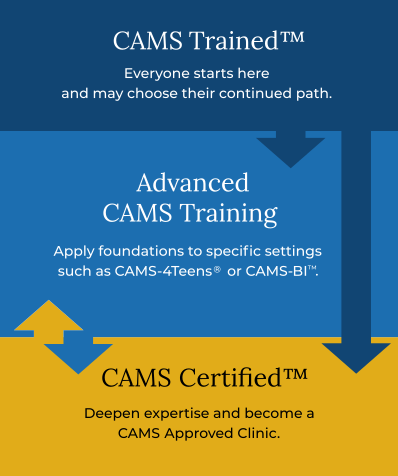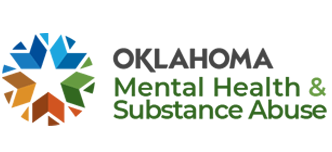Implement a consistent, scalable, and effective suicide-specific treatment across your entire operation.
Improve outcomes for at-risk patients when you prepare your group of 10 people or more in Clinics & Hospitals, Military & Veteran behavioral health centers, Sovereign Nations & Tribes, and Employee Assistance Programs. Create a shared language, culture, and confidence for mental health professionals of all kinds to save lives through empathy and collaboration.

State & Local Agencies
CAMS collaborates closely with state and local suicide prevention foundations and organizations to develop tailored training programs. These programs address the unique challenges faced by the populations served by these providers, elevating the level of care and support.
CAMS (Collaborative Assessment and Management of Suicidality) has trained thousands of providers from various areas of care and mental health fields, including state-level suicide prevention initiatives in Oklahoma, Ohio, Vermont, Utah, and Colorado.
Clinics & Hospitals
CAMS has been used extensively within outpatient and inpatient settings and as a brief intervention within psychiatric consultation-liaison services, including:
- Use by Crisis Response Teams and by Emergency Department providers to assess risk and determine disposition
- Short-term interventions in Inpatient Units
- Ongoing care in Intensive Outpatient Programs or standard Outpatient Treatment Clinics
Sovereign Nations & Tribes
Gain practical skills and confidence to treat suicidal risk through a proven, effective model while addressing and respecting the unique factors of your community.
CAMS has been successfully trained within sovereign nations with providers working with Native American tribes and nations in Oklahoma, New Mexico, and Arizona.

Students & Educators
Shape the future of mental health by equiping undergraduate and graduate students to lead through effective suicide-specific care.
If you’re an educator, the director of a college counseling center, a behavioral healthcare provider on campus, or an undergraduate or graduate student, integrate CAMS on campus through undergraduate and graduate education materials. Bring evidence-based Suicide Prevention Training to your campus.
Military & Veteran Service Members
Support your military and veteran service members through a lens of empathy and understanding as you effectively reduce their suicidal risk.
Clinical trials have demonstrated that CAMS is particularly effective in eliminating suicidal ideation among US Air Force personnel (Jobes et al., 2005) and US Army Soldiers (Jobes, Comtois, Gutierrez, Brenner et al., 2017). Additionally, CAMS has been shown to reduce emergency department visits and overall symptom distress while boosting resilience in certain subgroups of service members (Huh et al., 2018).
Employee Assistance Programs (EAPs)
Incorporate evidence-based CAMS into your EAP to reduce suicidal thoughts and behaviors in the workplace while simultaneously keeping at-risk employees safe and connected to their community.
Acknowledging the need for tailored solutions within Employee and Family Assistance Programs (EFAPs) to effectively tackle the pressing issue of suicide, CAMS-care developed CAMS EAP.
CAMS treatment helps employees stay out of the hospital in all but the most extreme circumstances. Through multiple RCTs, CAMS reduces suicidal ideation, hopelessness, and stress and restore functioning in as few as 6 sessions.
The Recommended Learning Path for Organizations
Individual clinicians & small groups can build a foundation of CAMS starting with becoming CAMS Trained:
Once you receive your CAMS Trained designation, consider continuing your training to meet unique needs and situations of patients across settings and demographics, including CAMS-4Teens, Supervising for CAMS, and other Advanced CAMS Training.
Clinicians can also continue to earn their CAMS Certified designation and become a CAMS approved clinic.
Your journey with CAMS starts now. Learn how to quickly, confidently, and effectively save lives.
Individuals and groups of 4 or fewer can order training directly through the CAMS Training Platform. Groups of 5 or more people are invited to contact our team to design a custom training program.
*Discounts available for groups of 50 or more.

We adopted the CAMS model as our clinical framework in our Suicide Prevention Program and have made CAMS Foundational Training a mandatory requirement of all clinicians practicing in our service.
Chris Harvey
Manager of Suicide Prevention
Mildura Base Public Hospital
I especially like that CAMS can be delivered concurrently with other manualized or non-manualized treatments (like DBT).
Haylie Stewart
Clinical Psychology Doctoral Student
University of Alabama
CAMS-Trained Organizations




Frequently Asked Questions
Yes, we have trained groups of less than ten attendees and we also encourage you to sign up multiple individuals to the Role-Play Training. Please complete our inquiry form with information about your organization and we will be happy to contact you to discuss the options available.
Yes, we would love to arrange for a consultant to visit your organization for a role-play training. Please complete the inquiry form and we will be happy to contact you. In response to COVID-19, we now provide group and individual Role-Play Training using the Zoom platform with Zoom Breakout Rooms for role-play sessions.
CAMS-care provides the only authorized training in CAMS that readily fits well into a Zero-Suicide policy effort. Dr. Jobes has been involved in the Zero Suicide movement since its inception and CAMS is consistently used within Zero Suicide initiatives as one of only a handful of suicide-specific evidence-based approaches to suicidal risk according to replicated randomized controlled trials.
We currently have studies underway to explore the efficacy of using CAMS in groups. At this time we do not recommend using CAMS in groups, but would encourage you to review the section in the CAMS Book that discusses the research underway regarding the use of CAMS in groups. We hope to have more information about our findings within the next year, so please check our website for updates.
Yes, CAMS is an excellent evidence-based suicide-specific clinical intervention that is well-suited for suicide prevention efforts funded by GLS. Many CAMS trainings have been conducted for state organizations and Native American behavioral health providers who have received GLS and other grants
As your group size grows, training costs per individual drop, typically for groups of 50 or more clinicians. Please complete our inquiry form and we will be happy to share pricing with you.
No, we have many organizations that opt to complete foundational training in CAMS by having staff read the book, complete the online video course, and attend a series of consultation calls. We have also split our Role Play Training into half-day sessions to fit with the needs of organizations. Please complete our inquiry form and we will be happy to contact you to discuss the options available.